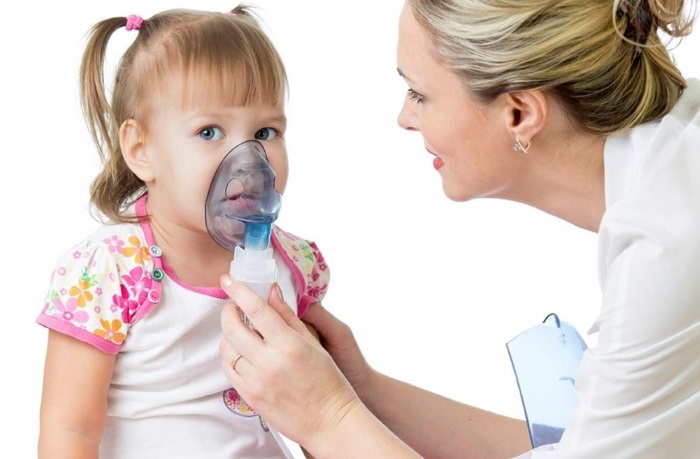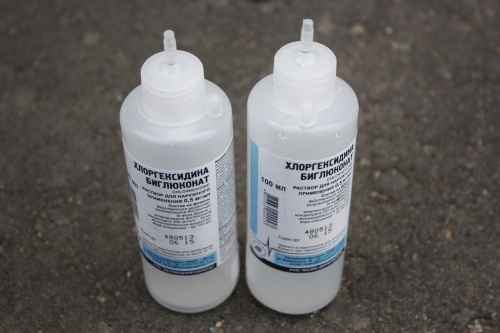Nasal drops with phenylephrine is a group of drugs local spectrum of action, which are used for the symptomatic treatment of colds and allergic diseases, accompanied by acute rhinitis.
Medicines containing this chemical are used as a monotherapeutic agent, and are also included in the composition of the therapeutic complex. A wide variety of effective phenylephrine-based drops and nasal sprays are currently available on the pharmaceutical market.
Record content:
- 1 What is phenylephrine substance?
- 2 Mechanism of action
- 3 Composition of nasal drops with phenylephrine
- 4 Release form
-
5 Indications
- 5.1 In adults
- 5.2 In infants and older children
- 6 Contraindications
- 7 Side effects
- 8 Overdose
- 9 How to choose drops at the pharmacy?
- 10 Instructions for use
-
11 List of the best phenylephrine nasal drops
-
11.1 For adults
- 11.1.1 Vibrocil
- 11.1.2 Adrianol
- 11.1.3 Polydexa
- 11.2 For pregnant and lactating women
-
11.3 For babies
- 11.3.1 Vibrocil
- 11.3.2 Bebifrin
- 11.3.3 Nazol Baby
- 11.4 For other kids
-
11.1 For adults
- 12 Drug prices
- 13 Video about nose drops
What is phenylephrine substance?
Phenylephrine hydrochloride is a completely white or slightly yellowish powder with many small crystals that does not have a specific drug smell. This substance is readily soluble in ethyl alcohol and ordinary water.
In the industrial production of nasal drops, phenylephrine is used as an active substance that relieves painful symptoms associated with inflammatory processes in the nasopharynx. In scientific circles, this component also has a second name "mezaton".
Phenylephrine hydrochloride has vasoconstrictor properties, suppresses current symptoms in the form of acute rhinitis. In relation to patients suffering from an allergic reaction, this substance has an antihistamine effect.
Mechanism of action
Phenylephrine nasal drops are combination medicines that include there is not only mezaton, but also other chemical compounds that exhibit therapeutic properties.
After spraying the nasal spray into the cavity of the nasal canals and getting its active components on the mucous membrane of the nasopharynx, its main substances are absorbed into the blood vessels.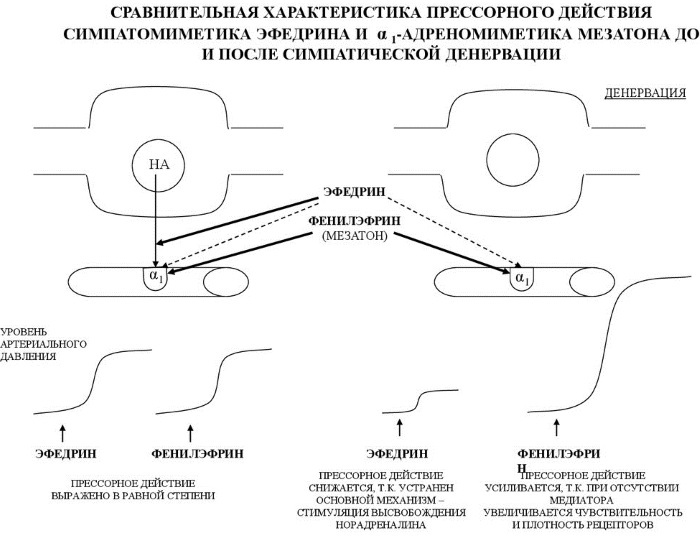
In this case, phenylephrine has a vasoconstrictor effect of moderate intensity. This therapeutic effect is achieved through direct stimulation of sensitive alpha-adrenergic receptors, which are located in the venous vessels of the nasopharynx.
Due to these pharmacodynamic properties of phenylephrine, the effect of eliminating edema of the paranasal sinuses, as well as the mucous membrane of the respiratory canals, is achieved. A patient with signs of rhinitis begins to feel much better. The discharge of a runny nose stops, the nasal congestion goes away.
Phenylephrine-based nasal drops and sprays, which are produced with the addition of antihistamines, allow the use of these drugs in the treatment of allergic reactions.
Composition of nasal drops with phenylephrine
Phenylephrine nasal drops are topical therapeutic solutions that have a beneficial effect on the condition of the mucous membrane of the upper respiratory tract and paranasal sinuses. The table below lists the main formulations of medicines in this category.
| Name of the medicinal product | Components of medicines |
| Vibrocil | Vibrocil contains 2 main components in the form of phenylephrine (2.5 mg) and dimethindene maleate (0.25 mg). The latter component has antihistaminic properties, which makes it possible to use this drug in order to alleviate the symptoms of an acute allergic reaction. Vibrocil excipients are: purified water, lavender essential oil, citric acid, hypromellose, sorbitol, sodium hydrogen phosphate. |
| Adrianol | The constituents of Adrianol nasal drops are phenylephrine hydrochloride at a dosage of 0.5 mg, as well as lerimazoline with a mass fraction of 0.5 mg. The following substances perform an auxiliary function in this preparation: methylcellulose, sodium hydrogen phosphate, benzalkonium chloride, citric acid, sterile water, glycerol. |
| Bebifrin | The Bebifrin nasal spray contains an active ingredient in the form of phenylephrine hydrochloride with a concentration of 0.15 g. This is a pediatric dosage that allows the drug to be used to treat patients in a younger age group. Excipients of drops are macrogol, Trilon B, sterile water for injection, eucalyptol, disodium edetate, benzalkonium chloride. |
| Nazol Baby | Nazol Baby nasal drops contain the main substance phenylephrine hydrochloride with a mass fraction of 0.125 g. Auxiliary components are presented in the form of purified water, sodium hydrogen phosphate, macrogol, potassium dihydrogen phosphate, benzalkonium chloride.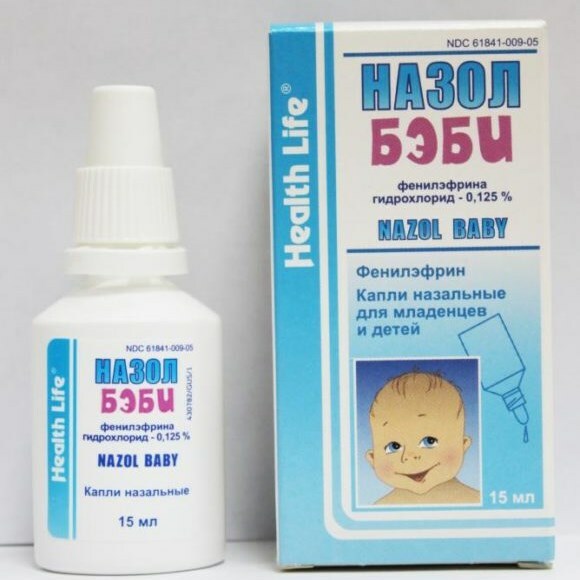
|
Most other phenylephrine nasal sprays and drops have the same chemical composition of the main and auxiliary components. The main difference lies only in the fact that the preparation can contain only one or several active substances at the same time. For example, a combination of phenylephrine with the antihistamine chemical dimetindene maleate.
Release form
Medicines containing phenylephrine are available in the form of nasal drops. The packaging of medicines in this category is carried out in plastic dropper bottles. The drugs themselves are a clear solution with a slight yellowish tinge without signs of sediment or turbidity.
The drops have no specific odor at all, and their appearance may be associated with a change in the chemical composition of the drug. The main package of nasal sprays is a cardboard box, inside which contains detailed instructions for the use of the medication.
Indications
Phenylephrine nasal drops are symptomatic therapy agents that are indicated for use to temporarily relieve the patient's well-being. In combination with drugs of this category, it is recommended to use medicines with anti-inflammatory and antibacterial properties, the action of which is aimed at eliminating the source of the disease.
In adults
For adult patients, phenylephrine-based nasal drops and sprays are indicated for use in the presence of the following diseases and symptoms of a pathological condition of the nasopharyngeal mucosa:
- acute rhinitis caused by viral, bacterial or fungal infections;
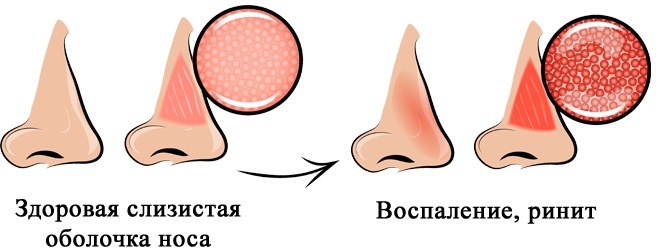
- sinusitis with an acute or chronic form of the course, which is provoked by the negative effects of external and internal factors;
- vasomotor rhinitis;
- inflammatory processes in the tissues of the inner ear (in this case, the nasal spray is indicated for use as an aid to accelerate the patient's recovery process);
- complex treatment of sinusitis;
- chronic rhinitis.
Phenylephrine nasal drops can be prescribed for adult men and women to relieve inflammatory process and edema of the mucous membrane of the epithelial tissues of the nose before performing surgical operations in the area paranasal sinuses. Medicines of this group are indicated for use during the postoperative recovery of the nasopharynx.
In infants and older children
Phenylephrine nasal drops are a separate group of drugs that can be used for the symptomatic treatment of young children. Nasal sprays based on this active substance are used to eliminate the following signs of the disease that occur in infants and older pediatric patients:
- colds accompanied by acute rhinitis;
- chronic diseases of the upper respiratory tract, in which the child periodically has a runny nose with the release of thick or liquid snot, nasal congestion is present;
- hay fever attacks;
- flu and other acute respiratory viral infections;
- acute or chronic sinusitis;
- allergic reactions of the body caused by irritation of the mucous membrane of the nasopharynx with plant pollen, mold spores, household dust, hair of pets and farm animals, and other factors.
Despite the fact that phenylephrine nasal sprays are approved for use in children under 1 years, medicines of this category are prescribed with extreme caution to patients under the age of 6 years old.
In this case, it is necessary to strictly observe the dosage regimen of the drug, so as not to provoke the development of side effects. A child receiving therapy with phenylephrine drops should be monitored by doctors.
Contraindications
Drops and nasal sprays with phenylephrine are categorically contraindicated for use for adults and children who have the following health problems:
- sclerosis of the coronary vessels;
- angina pectoris;
- severe pathologies of the cardiovascular system associated with circulatory disorders;
- thyrotoxicosis of the thyroid gland of a chronic form of the course, or in an exacerbation stage;
- diabetes mellitus of all types;
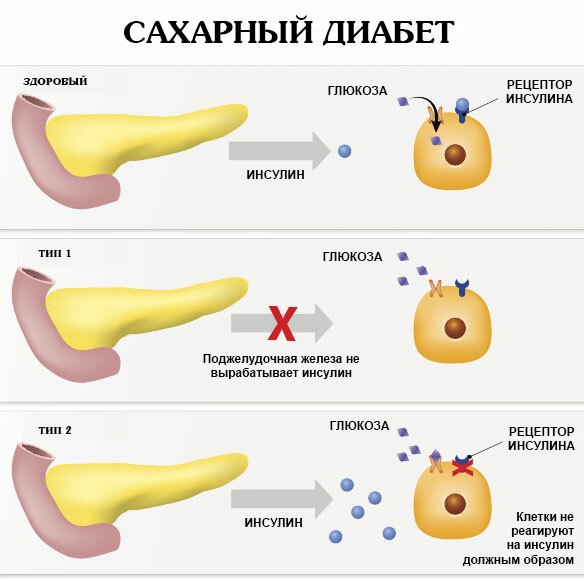
- arterial hypertension with a tendency to develop a hypertensive crisis;
- individual intolerance to the main or auxiliary components of the drug, which is manifested by allergic reactions of the body.
There is a lack of clinical data on the effect of phenylephrine on the child's body during lactation. There are no categorical contraindications for the use of nasal drops for nursing mothers, but at the same time, therapy with medications based on this substance should be carried out only as a last resort.
Side effects
Phenylephrine drops and nasal sprays are well tolerated by adults and children of all age groups.
Despite this, manufacturers of drugs in this category focus on the risk of developing the following side effects:
- tremor of the upper limbs;
- dizziness and lack of coordination of movements;
- insomnia and other sleep disorders;

- heart palpitations accompanied by severe arrhythmia;
- an increase in blood pressure indicators (in people initially prone to hypertension, a hypertensive crisis may occur);
- tingling and burning sensation inside the nasal passages, which occurs immediately after the introduction of the drug;
- increased activity of sweat glands with abnormally profuse sweating;
- pallor of the skin.
In case of individual intolerance to one or several components of phenylephrine-based drops at once, side effects in the form of an allergic reaction are possible. In the presence of these circumstances, the patient shows signs of itching of the mucous membrane of the nasal canals, a feeling of excessive dryness, redness of the epithelial tissues.
Patients faced with the appearance of side effects of nasal drops should stop further taking these drugs, and also inform their doctor about the incident.
Overdose
In medical practice, there are no clinically confirmed cases of overdose with nasal drops, the active ingredient of which is phenylephrine hydrochloride.
With systemic absorption of this substance, signs of intoxication of the body may occur, accompanied by the following symptoms:
- a feeling of heaviness in the upper and lower limbs;
- increased blood pressure;
- the development of ventricular tachycardia, which can be eliminated only after the complete cancellation of nasal drops;
- increased excitement of the central nervous system;
- headache and confusion;

- ventricular premature beats.
Disorders of the digestive system are unlikely, since phenylephrine hydrochloride predominantly affects the heart, blood vessels, and nerve fibers.
Patients with signs of an overdose of this substance are prescribed symptomatic therapy in the form of intravenous injection of Fentolamine, as well as drugs from the pharmacological group beta-blockers.
How to choose drops at the pharmacy?
Phenylephrine nasal drops should be purchased from your pharmacy after being prescribed by your healthcare professional or otolaryngologist. In this case, there will be no questions about the choice of medication and the dosage of the active substance. When self-treatment of rhinitis, you need to pay attention to the constituent components of the drops.
For the treatment of a runny nose triggered by a cold, acute respiratory viral infection, flu or prolonged hypothermia it is enough for the body to purchase a nasal spray containing exclusively phenylephrine and auxiliary substances. If it is necessary to suppress rhinitis of an allergic nature, you will need to purchase drops, which additionally include an antihistamine component.
Instructions for use
Before instilling the drug, it is necessary to thoroughly clean the nasal passages from the mucus accumulated in them. After that, you should tilt your head back, and then add the medicinal solution alternately to each nostril. Within the next 5 minutes. it is recommended to observe complete physical rest so as not to provoke the outflow of the medication.
Adult patients, as well as children over 6 years of age, receive a dosage of 3-4 drops, which are introduced into the nasal passages 3 to 4 times a day. A child under the age of 1 year should be instilled 1 drop of the medication no more often than every 6 hours.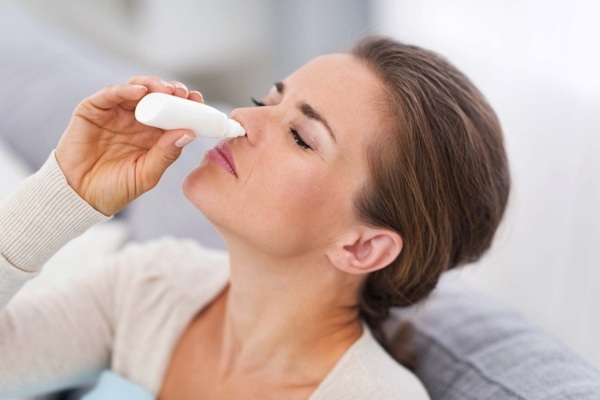
Children of the age group from 1 to 6 years old receive a dose of phenylephrine 1-2 drops 3-4 times a day. The duration of therapy with drugs based on this substance should be no more than 3 days.
List of the best phenylephrine nasal drops
There are a large number of effective nasal drops on the pharmaceutical market. based on phenylephrine hydrochloride, which are used to treat adults and children of all ages groups.
For adults
For adult patients, drops and nasal sprays are used, which contain exclusively phenylephrine, as well as other active ingredients, depending on the type of current disease.
Vibrocil
Vibrocil is an effective drug, the main substances of which are phenylephrine hydrochloride and dimethindene maleate. This drug is indicated for use not only for rhinitis of a cold or infectious etiology, but also in the event of an acute allergic reaction. The medication is available in a convenient bottle with a dispenser cap, the capacity of which is 10 and 15 ml.
Adrianol
Adrianol is a nasal drops that are produced in the form of a clear solution, and the direct filling of the medication is carried out in 10 ml vials.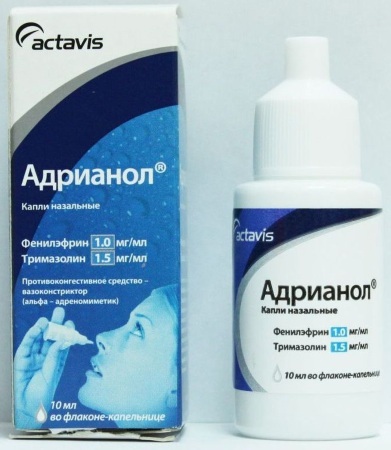
This drug is effective in acute and chronic rhinitis of any origin. Also, the medication is used as a preparatory agent before surgical intervention on the tissues of the nasopharynx.
In addition to phenylephrine, Adrianol contains the active substance lerimazoline.
Polydexa
Polydexa is a nasal spray that has a complex chemical composition. These nasal drops contain active substances in the form of neomycin sulfate - 6500 IU in 1 ml, dexamethasone sodium - 250 μg in 1 ml, polymyxin B sulfate - 10,000 units in 1 ml, phenylephrine hydrochloride with a concentration of 2.5 mg in 1 ml.
The drug has a wide spectrum of action, allowing to eliminate the manifestations of acute rhinitis of any nature of origin. Nasal drops are dispensed with a prescription.
For pregnant and lactating women
Women who are breastfeeding and pregnant are treated with the same drugs as other adults. These are nasal drops Adrianol, Polydex and Vibrocil.
In this case, one should take into account the fact that there is no clinical data on the effect of the above drugs on the development of the fetus. In this regard, these drugs are used only as a last resort, when it is impossible to do without drug therapy.
For babies
Phenylephrine nasal drops can be used for children under 1 year of age. In this case, drugs are used for the adult age category, as well as special sprays created exclusively for babies.
Vibrocil
Vibrocil is prescribed for children under 12 months of age. in dosage - 1 drop in each nostril, which is instilled 2-3 times a day. The duration of treatment is no more than 48 hours. In this case, the child must be under the supervision of a pediatrician.
Bebifrin
Bebifrin is a nasal drops that are specially created for children of younger and middle age groups with a dosage of the active substance of 1.25 mg.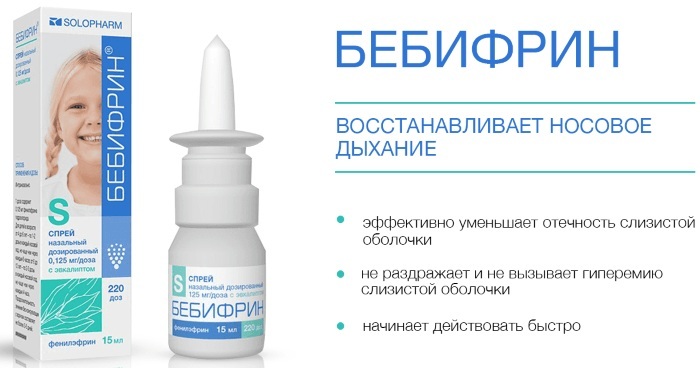 The drug is prescribed 1 drop in each nasal canal 2 to 3 times a day.
The drug is prescribed 1 drop in each nasal canal 2 to 3 times a day.
Nazol Baby
Nazol Baby are nasal drops of Italian production, which are created on the basis of phenylephrine hydrochloride with a concentration of the main component of 0.125 g. The drug is available in dropper bottles of 5, 10 and 15 ml.
The medicinal solution is completely transparent with no signs of a specific odor. For infants, the dosage of this medication is 1 drop in each nostril 2-3 times a day with a course of therapy for 3 days.
For other kids
Children aged 1 to 6 years can be treated for acute and chronic rhinitis, sinusitis, inflammatory processes in the nasopharynx using the following nasal drops containing phenylephrine hydrochloride:
- Vibrocil;
- Adrianol;
- Nazol Baby;
- Bebifrin.
For patients of this age category, the dosage with the above medicines is 1-2 drops in the nose from 3 to 4 times a day. The duration of treatment remains unchanged, amounting to 3 days. Children over 6 years of age receive adult doses.
Drug prices
The table below lists the average cost of phenylephrine nasal drops.
| Name of drugs | Medication price |
| Adrianol | RUB 145 |
| Vibrocil | 370 rbl. |
| Nazol Baby | 240 RUB |
| Bebifrin | RUB 165 |
| Polydexa | 416 RUB |
Phenylephrine nasal drops are effective medicines that are used for the symptomatic treatment of inflammatory diseases of the nasopharynx, as well as the paranasal sinuses. Medicines of this group are used in the treatment of acute and chronic rhinitis provoked by the influenza virus, ARVI, allergic reaction to external stimuli.
Phenylephrine-based nasal drops and sprays are used in the preparation of a patient before surgery on the tissues of the nasopharynx. The use of drugs of this group is also indicated during the postoperative rehabilitation period. The general terms of therapy with nasal drops with phenylephrine should not exceed 3 days.
Video about nose drops
Komarovsky about vasoconstrictor drops:

